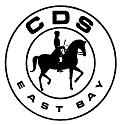by Tonya Johnston
Appeared in California Dressage Society East Bay Chapter
February ’03 Newsletter
As we look forward to the rest of this year, it is important to set new goals and plan strategies for achieving them. Be mindful that as you set new goals you include both the mental and physical aspects of riding.
Now that 2003 is already underway, let’s take a moment to think about your accomplishments in 2002. Have you given yourself credit for your progress and the hard work you put in with your horse? If not, take a minute now and jot down a list of the goals you accomplished in 2002. Include goals you achieved; special moments of grace and success (in lessons, shows, clinics, et. al.); specific skills you and/or your horse learned; general “ah-ha” moments that brought you closer to long-term goals; etc. Enjoy reliving these moments as you remember them, they are experiences to treasure! Writing these memories down and reviewing your year is an important part of building confidence and fueling your motivation to reach for new goals in 2003.
As we look forward to the rest of this year, it is important to set new goals and plan strategies for achieving them. Be mindful that as you set new goals you include both the mental and physical aspects of riding. For example, it is great to say you want to try showing your new horse this summer, but if the mere thought of it creates a riot of butterflies in your stomach – chances are you have both mental and physical preparation ahead of you. Go ahead now and jot down a list of goals. Be sure that they are positively phrased, challenging, based on your own performance, realistic for you, specific and including target dates. Next, brainstorm some strategies that will help you achieve those goals. Good goals are always supported by strong and specific strategies.
Sport Psychology contains many strategies that can play vital roles in maximizing your mental and physical skills as a rider. By learning new mental tools and polishing the ones you already use in your riding, you become much better equipped to accomplish your physical riding goals. The sport psychology techniques below are examples of strategies you can use for achieving your goals in 2003.
Breathing Exercises
Use breathing exercises such as Circle Breathing, Ratio Breathing, and Centered Breathing when you begin feeling anxious, nervous, or distracted. For example, in Circle Breathing: breathe slowly in through your nose, hold for a beat, and gently exhale for a longer amount of time through your mouth. For each person, using breathing techniques may be best at different times in the day; listen to your body and commit to taking the time to calm and focus yourself.
Direct Your Focus
Keep your mind in the present moment; focused on things you have control over. Use cue words to direct your attention to the specific areas you need to focus on in your rides. This will keep your mind on your performance (over which you have control!) and away from the past, a mistake, or your placing in a class (over which you do not have control!).
Use Imagery
Use visualization before a lesson or a test at a show. Use your mind’s eye to create a vivid and successful performance with as many details as possible, especially those things for which you have cue words or specific goals. (E.g. If your horse cuts in on his circles when tracking left, feel yourself using your inside/left leg and notice how round and smooth the circles feel throughout your whole ride).
Reframe Your Energy
Instead of trying to ignore butterflies in your stomach (or pretending they aren’t there) interpret their presence as a sign that you have the energy to ride well. Harnessing the butterflies and getting them to work for you is key. The added arousal you feel before a challenging lesson or important show can actually help you accomplish the performance goals you have set for yourself and your horse. In this way, ‘making friends’ with the butterflies can be a bonus!
Confidence = Positive Thinking
Increase your self-confidence one building block at a time. Commit to using positive self-talk when you prepare to ride and while you’re on your horse. Say only positive self-statements about what you are doing and want to achieve. Review your rides in order to record in a log or journal the things you have accomplished – the positive steps you have taken and the goals you have met.
With these strategies in mind, bring yourself good luck, have fun ~ and take note of your progress. You will soon find yourself well on the road to fulfilling your goals in 2003!


